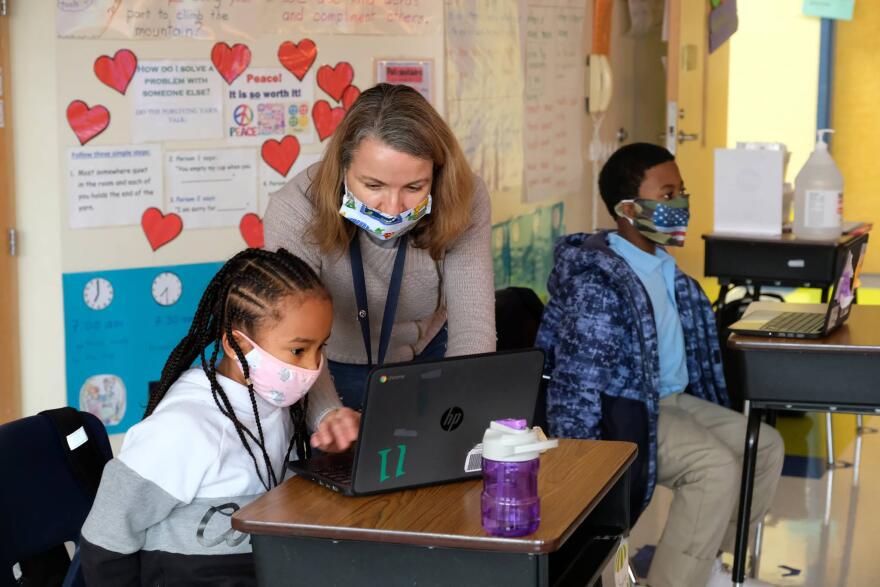As we recover from the pandemic and move forward in education, there are lots of adjustments being made. Adjustments in returning to in-person classes, expanding summer school, teachers helping students recover from learning loss. You get the idea — a new normal.
This week, as part of our weekly series, Rebuilding Charlotte, we reached out to Tamika Kelly to discuss these issues. She's the president of the state's largest teacher's group, the North Carolina Association of Educators.
Marshall Terry: Welcome.

Tamika Kelly: Thank you for having me.
Terry: The NCAE has been vocal about its support for a slow return to in-person classes. Does your organization at all feel betrayed by Gov. Roy Cooper and Democrats over the compromise reached earlier this month about mandating all districts return to in-person classes?
Kelly: Well, we have been very clear since the beginning of this pandemic that we wanted to be able to return to school buildings in a safe way. And so we were very conflicted about what happened with Gov. Cooper and the other legislators reaching this bipartisan measure, because we have always believed in making sure that schools are safe places for our employees and our students. And so we wanted to make a measured approach to make sure that all of the safety concerns that were being raised around school, in-person instruction, were being attended to very carefully.
Terry: The NCAE has pushed hard for a "go slow" approach to bringing students back in person, even as health officials have increasingly urged opening up in-person classes and the evidence of academic loss grew. Does your organization have any regrets about how it's approached returning to in-person classes?
Kelly: We don't have any regrets. We do know that when we were talking about resuming in-person instruction, one of the things that we think is really important and we continue to stress is that educators need to be at the table of any district's reopening plans. Because we are the individuals, the group, who have to put these practical plans into action.
And so we have pinpointed lots of questions. People want to know how are the logistics working? How are we going to keep each other safe? What are the procedures and protocols necessary to ensure not only the safety of all of the individuals in the school building, but also make sure that we are addressing academic needs, as well?
Because if we are looking at mask compliance and we're trying to enforce social distancing, how does that fare against trying to make sure that we are actually doing the things that we are supposed to do in our school buildings, which is teach? So that has been quite a challenge.
Terry: Many districts are now in the process of planning full-time virtual academies. What do districts need to consider as they move forward on that?
Kelly: So, one of the things, of course, our districts need to consider is staffing. They need to consider access to devices and also access to the Internet, in general, right? Not only bridging the digital divide by providing more laptops and hotspots, but also how are we working with businesses and corporations to improve connectivity for lots of places?
And also, how are we adopting the flexibility that allows students to learn and move at their own paces? And how do we integrate that into the classroom so that our students continue to be successful? And then lastly, of course, how do we continue to foster that school-parent relationship and also address social emotional needs well beyond just doing modules and scripted programs. But how are we really deepening and building that relationship so that students and educators continue to thrive.
Terry: In Charlotte-Mecklenburg Schools, there have been many students who have left the district over the past year for private schools. Are you concerned that they may not come back?
Kelly: I'm actually not concerned. I know that many families did make a choice to send their kids to private schools. One of the beautiful things about public schools is that we take all students, but we also make sure that we have high standards.
And so one of the things that we noticed during the pandemic is that while people did go to private schools, private schools had a lot more safety issues around COVID-19. They were the biggest drivers of clusters in any K-12 setting. And so we know that our public school educators and our school staff worked really hard to make sure we had safe conditions in our public schools that weren't replicated in our private schools.
Terry: It's been a tough year for students and also for teachers. What's morale like among teachers right now? Are you seeing more leave the job?
Kelly: So, we have seen — even earlier in this year — lots of people decide to leave, resign or retire way earlier than they expected they would. Because it has been a difficult time to be an educator. So our teachers have been, of course, frustrated because we have stripped the humanity of educators out of the conversation when we talk about resuming in-person instruction. They have families. They have loved ones. They're parents, themselves.
And so it has been a very challenging conversation to have around school reopening. When we argue for safe conditions. When we talk about work load, and some of our educators are teaching in-person and virtually at the same time. So our educators have been really struggling.
Terry: Thank you for taking the time.
Kelly: Thank you so much.
Terry: That's Tamika Kelly, president of the North Carolina Association of Educators.




